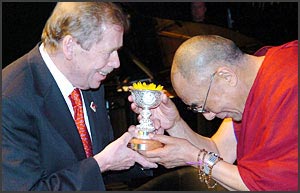
The Dalai Lama presents ICT Light of Truth Award to Vaclav Havel in 2004. (Stepniak, Berlin)
In a condolence letter to Havel’s wife, Mrs. Dagmar Havlova, the Dalai Lama, who considered Havel a ‘dear friend,’ wrote
“the world has lost a great statesman whose steadfast and unflinching determination played a key role in bring freedom and democracy to the then Czechoslovakia” and he recalled that he had had the privilege of first meeting President Václav Havel in February 1990, months after the Velvet Revolution, “which he had led with an extraordinary display of people power.”
The two human rights leaders met many times over the years. In a ceremony held in Berlin in 2005, the Dalai Lama presented Vaclav Havel, a member of the International Council of Advisors , the ICT Light of Truth Award. At the time, Lodi Gyaltsen Gyari, Special Envoy of His Holiness the Dalai Lama and ICT Executive Chairman, said that Tibetans had much to learn from Vaclav Havel’s writing and values, “For instance his letter to Alexander Dubcek [Czech communist leader] can also be read as advice for the Tibetan leadership in its dealings with the Chinese authorities, and some of the warnings Havel offers to Dubcek we too must take to heart…I could also not help but find many parallels between His Holiness the Dalai Lama and President Havel both in their thinking and in their approach to issues. There are some phrases that could very well come from either of them. For example, in a section of his interviews when President Havel was asked if he ever felt hatred towards his jailers, he responded: ‘No, I do not know how to hate, and that pleases me, if for no other reason than because hatred clouds the vision and makes it difficult to seek the truth’…Another example where again it becomes difficult to know who is speaking, the Dalai Lama or President Havel: I am not on the side of any establishment, nor am I a professional campaigner against any establishment – I merely take the side of truth against lies, the side of sense against nonsense, the side of justice against injustice.'”
Vaclav Havel faced constant harassment and imprisonment during the Soviet era as Czechoslovakia’s most influential dissident. His plays satirized the surreal nature of the Czechoslovakian experience under Soviet domination, which he characterized as ‘Absurdistan.’ He was a principle author of the 1976 Charter 77, a political manifesto calling for human rights and democratic reform. The Communist government of the time reacted harshly, describing the Charter as “anti-state, anti-socialist,” and its individual signatories as “traitor” and “agent of imperialism,” etc.
Vaclav Havel’s writings continue to inspire political thinkers and provoke harsh responses long after his own battle against communism was won when Czechoslovakia reclaimed its independence in 1989. In 2008, more than 250 Chinese intellectuals and human rights activists, including Liu Xiaobo, released Charter 08, a manifesto calling for an independent legal system, freedom of association, and the elimination of one-party rule in China. Liu Xiaobo was imprisoned as a result in December 2008 and awarded the Nobel Peace Prize in 2010, a nomination that had been supported by Havel, who took every opportunity to call for Liu’s release. In Tibet, a new generation of Tibetan intellectuals share with Havel a courageous commitment to truth, including the writer Tagyal who was imprisoned in 2010 following publication of his now banned book, The Division of Heaven and Earth. (ICT report, Tibetan writer Tagyal released from prison on bail)

